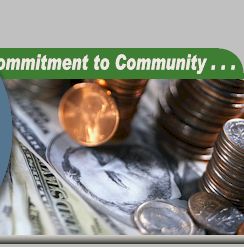Lost / Replacement Credit and Debit Cards:
ATM / Debit Cards: Call Richland Federal CU at 406-482-2704
Visa Credit Card: Call Richland Federal CU at 406-482-2704 or 800-558-3424
How We Protect Your Money:
Your savings are federally insured to $250,000 through at least 2013 and backed by the full faith and credit of the National Credit Union Administration (NCUA), an agency of the U.S. Government.
In addition to NCUA insurance, many other precautions are taken to protect members' funds in the Credit Union, including annual audits by an NCUA examiner, an independent auditor, and by our volunteer Supervisory Committee.
What You Can Do To Protect Yourself!
There are several steps you can take to protect yourself from identity theft, frauds and scams. The easiest and often most effective step you can take is to pick up the phone and call us! ALWAYS CALL FIRST (406-482-2704) to verify any suspicious notices you may receive whether through the mail, e-mail, phone calls, or faxes. We can help you verify if something is not legitimate.
In addition when banking online, always be sure to check that the security image you selected is visible BEFORE entering your password information.
Common Security Concerns:
Identity Theft is when someone tries to steal another person’s identity, usually to gain access to their finances. They will try to steal your name, address, social security number, credit card numbers or other identifying information without your knowledge.
Phishing is when someone tries to lure you into revealing personal details (like passwords or credit card information) on a fake web page or email, pretending to be a legitimate company. Your information may then be used to gain access to your finances.
Fraud and scams are when someone is trying to deceive you for personal gain.
What to Do About Identity Theft, Phishing and other Financial Frauds
It’s a good idea to stay informed, so you can spot a financial fraud before becoming a victim. There’s lots of information online to help you do that AND to help you recover if you’ve been victimized. Here are just a few:
Our own Home and Family Finance Resource Center is an excellent source for researching this issue, with numerous informative articles and prevention tips available.
This site provides practical tips from government and technology sources to help you guard against Internet fraud, secure your computer and protect your personal information. The site includes lots of information spiced up with video clips and games.
This website by the Federal Trade Commission is a one-stop national resource to learn about the crime of identity theft. On this site, consumers can learn how to avoid identity theft – and learn what to do if their identity is stolen. Businesses, too, can learn how to help their customers deal with identity theft, as well as how to prevent problems in the first place. And law enforcement can get resources and learn how to help victims of identity theft.
This website, created by the three nationwide consumer credit reporting companies - Equifax, Experian and TransUnion, is a centralized service for consumers to request free annual credit reports. It provides consumers with the secure means to request and obtain a free credit report once every 12 months from each of the three nationwide consumer credit reporting companies. Regularly monitoring your credit report can help you detect identify theft.
Call For Action, Inc. (CFA) is an international, nonprofit network of consumer hotlines affiliated with local broadcast partners. Its services, using trained professionals, are free, confidential and available to individuals as well as small businesses. Its website includes numerous articles on how to identify and combat financial fraud.
This website is operated by the Anti-Phishing Working Group (APWG), a global pan-industrial and law enforcement association focused on eliminating the fraud and identity theft that result from phishing, pharming and email spoofing of all types. It has several very helpful tips for consumers on how to avoid phishing scams.
This web page maintained by the Credit Union National Association includes national scam alerts regarding Internet and credit card fraud, along with numerous links for additional information.
The Looks Too Good To Be True website was built to educate consumers and help prevent them from becoming victims of an Internet fraud scheme. The website was developed and is maintained by a joint federal law enforcement and industry task force. Funding for the site has been provided by the United States Postal Inspection Service and the Federal Bureau of Investigation. Key partners include the National White Collar Crime Center, Monster.com, Target and members of the Merchants Risk Council.
This is a great site for Fraud Prevention. It will make you aware of Identity Theft, Online Scams, Email Scams, Phishing and Credit Card Fraud. There are many resources in this site to show you the best way to prevent being a victim of online fraud.


